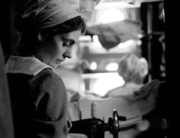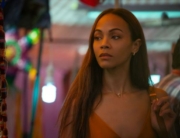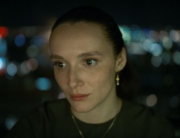As you might expect from the rather portentous title, Three Worlds is ultimately a parable, which is to say that writer/director Catherine Corsini lets her own ideas get the best of her. In the first few minutes, she quickly and efficiently draws fine, careful outlines of her characters, each differentiated through an attention to the nuances of expression and emotion. But by the end, those outlines have been bluntly filled in with brute primary shades that highlight Corsini’s moralistic tendencies and render her characters schematic.
The opening scene finds three buddies fooling around in an empty parking lot, acting so recklessly that it takes a few moments to realize they’re celebrating—the leader of the pack, Al (Raphaël Personnaz), is due to be married to his boss’ daughter in 10 days’ time. Shortly afterwards, Al and his friends find themselves fleeing a crime scene after hitting a pedestrian with the borrowed Mercedes, all of which is witnessed by Juliette (Clotilde Hesme). In the days afterwards, she becomes involved with Vera (Arta Dobroshi), the wife of the injured man, and recognizes Al when he visits the bedside of the man he struck. The web only gets more tangled from there.
The three of them constitute the eponymous three worlds, though in truth none of them seem different enough from the others to constitute distinct domains. For all their nominal distinctions—Al is a salesman at a car dealership, Juliette is a student, and Vera works as an undocumented Moldovan immigrant at an unspecified job—they all seem to inhabit the same, clean, middle-class environs, moving through generic apartments and sidewalks populated by a smattering of demographically appropriate compatriots.
The trio becomes more and more intertwined, with Juliette acting as a negotiator between Al and an unwitting Vera—Al would rather pay off Vera than turn himself over to the police. The sameness of their visual characterization initially disguises the inevitability of the melodrama that eventually erupts, though tempered by Claire Mathon’s white-lit cinematography, which is at once realistic and romantic. It helps to gently leaven a story that too easily could have turned maudlin. The betrayals, secrets, and anger that emerge are both affecting and distancing, obvious attempts to push the audience’s buttons that nonetheless hit their mark in an understated, Gallic take on the Crash school of narrative.
As Three Worlds shows more of its hand, the appealing actors have a harder time sustaining your interest and affection. Al’s prettiness grows thinner and thinner as his actions move from those of a decent guy caught in a bad situation to those of a flat-out ass. Most of his rep for the latter comes from his interactions with Juliette, who Hesme plays with a skittish, doe-eyed loveliness that increasingly seems like misdirection for the careless thoughtlessness underneath her actions.
Of the leads, Dobroshi is the only one who manages to cling to the integrity of the character she plays. This is in part due to the exigencies of the soap opera narrative, which piles injustice after injustice on Vera’s sturdy shoulders and saddles her alone with the joint burdens of justice and forgiveness. Dobroshi possesses a face perfectly poised between extreme beauty and plainness. A rich presence on screen, Dobroshi never resorts to the shorthand of tics and habits to convey character. Instead, by keeping viewers at arm’s length, she makes a covert—and successful—ploy for their sympathies, and remains incandescent and complicated in a film whose easy answers finally trump its delicately shaded questions.







Leave A Comment